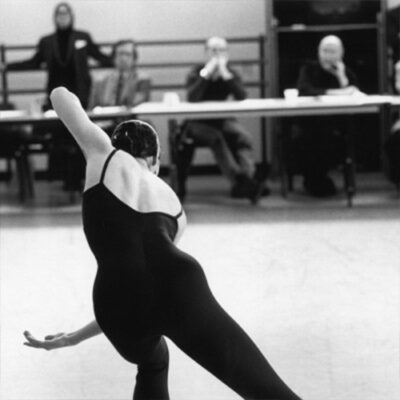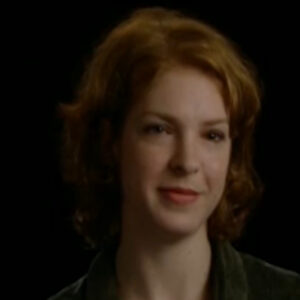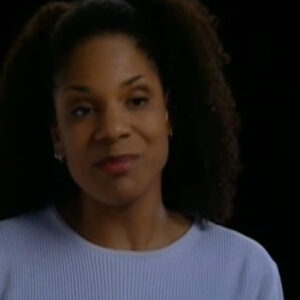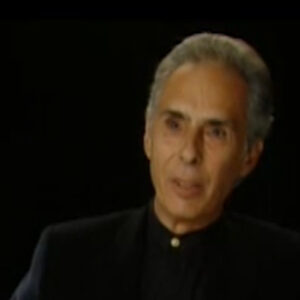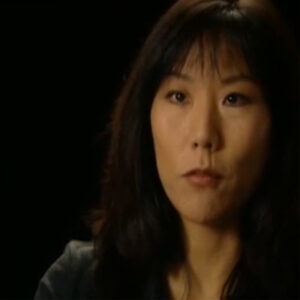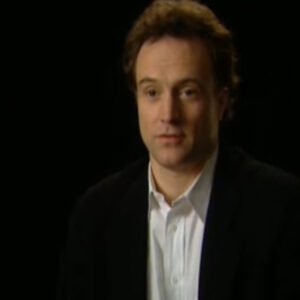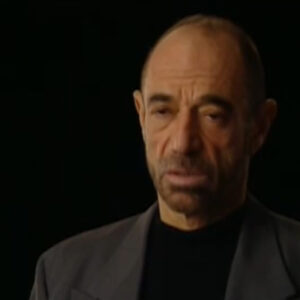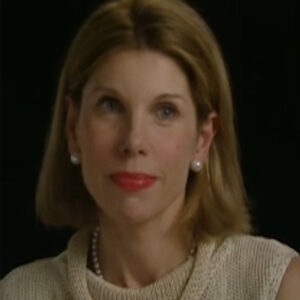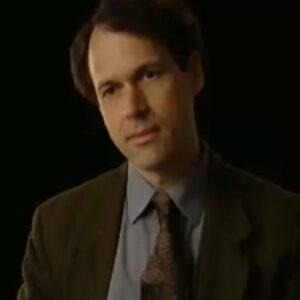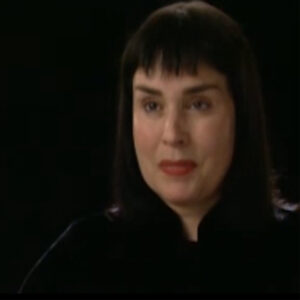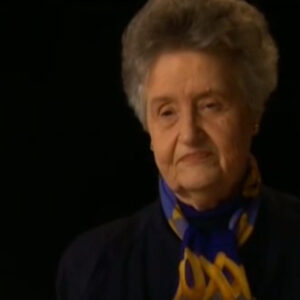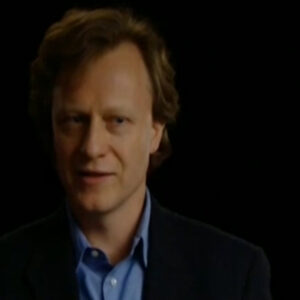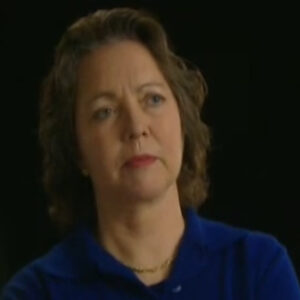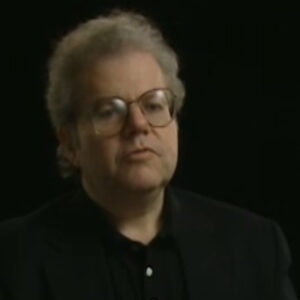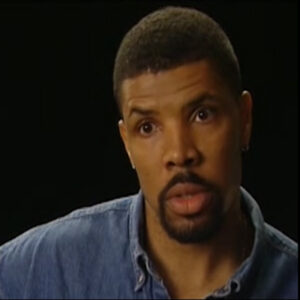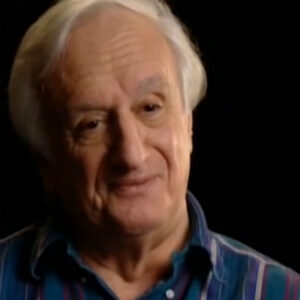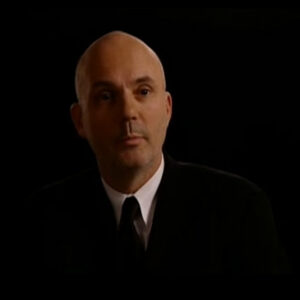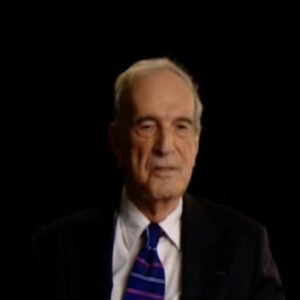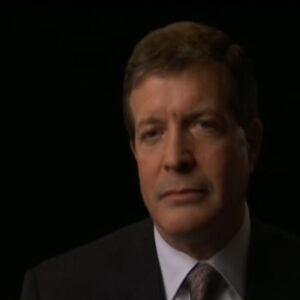Speaker Yeah, I do, too, I think that I was just reflecting on it in terms of the whole music picture beyond the piano department, and I was thinking about how very often people have this impression that Juilliard up until recently hasn’t been very interested in new music and that a lot of the performers who come out of Juilliard have been primarily focused on the traditional repertoire of the old music. But the funny thing is that at the same time, that’s perhaps been the case in the in the majority of those performers. But at the same time, there were always a few people who were passionately committed to new music. And there were composers working at Juilliard, not only teaching composition, but also teaching Elhanan, who were the most important composers of their time. I mean, you know, back in the 70s, you had Berio you know, we’ve had Elliott Carter and Milton Babbitt and all kinds of really important people. Now there’s choral piano, Bob Baeza. And, you know, it’s it’s so at the same time, you have these performers who were primarily focused on the past. You had this in the same building. You had other people who were only focused on the present and the future. And so not only was there a nationalistic combining of things, but there was also this kind of past and present thing going on. It also amazes me how, even though the music training at Juilliard has up until now really been focused on classical music, that even though that’s always been the case, a lot of important performers in non classical musics have emerged from Juilliard. And that always seemed like some kind of strange secret. But I realized I realized increasingly that it makes perfect sense. You know, it’s kind of like Juilliard has given those people a foundation and then from that, they were able to do something else. And, you know, somebody I’ve been very involved with in terms of playing his music is Philip Glass. And I think that’s a very interesting case because Philip was at Juilliard. I think a sort of typical student. He wrote music that was very informed by the structures that people in the Uptown music world were comfortable with back in those times. I’m speaking about the late 50s, early 60s, and then after Juilliard, he completely abandoned that voice and took up something completely different. And rather than I used to see that as a contradiction, you know, it seemed like, well, how could he do that? But I now feel it.
Speaker It’s just some kind of development that was you know, it’s it’s not at all hard to understand how that happens. The basis that he that he started from allowed him to do something else. And, you know, I think ideally that’s what I hope the future of the school is going to be, that we’re going to acknowledge more openly that our role may not be to pass along verbatim, some kind of tradition that exists as a fixed thing, but to encourage people to use the past to create something in the future that, although it’s rooted in those traditions, is going to be something new and is going to be something that has the possibility to speak to the audiences that they are going to be addressing. So I really think that’s the way that Juilliard has changed and is changing right now very quickly, that it’s not going to be just about recreating something past, not about celebrating the glory of the past, but about really creating some new glory. And I think that that’s you know, that’s why I don’t like the word conservatory anymore, because I think the word conservatory, of course, suggests preservation. And there’s nothing wrong with that. But as long as it seemed to be something that’s fluid and developing and not something that’s just frozen.
Speaker Well, a lot of that is changing, and I know it’s created some factions in the battle that I’m thinking of factions.
Speaker Yes.
Speaker In regards to Elena, in regards to. I mean, maybe less so kind of literature in what Joseph Bluff’s started as sort of.
Speaker Well, I mean, I’m a department of one, so it’s very convenient for me in that way. You know, I don’t have to answer to anybody.
Speaker Talk a little bit about. We we we talk to just block, but talk a little bit about about Schumann and these these these visions that he started in which people would do more than just play their instrument. But there was something very important about this. This literally. I mean. And what you know is if someone who was watching would know what are these things that he decided to do? Right.
Speaker Well, I think the argument always has gone on in training musicians or perhaps in training any kind of artists. How much one ought to focus on the art itself. The real specifics of the task or how much one ought to include a broader kind of education, that is.
Speaker That is a necessity, really, for understanding the art. And you always have this dilemma. You don’t have time to do enough of both of those things. And I think in every music school, the battle rages between people who think their students ought to be spending more time practicing their instruments. And the other people who are saying, oh, no, they’re already practicing too much. They don’t understand what they’re doing. They need to have a broader cultural base. And I think that Schumann, as much as I understand what he what he envisioned was trying to create a situation where we would have performers and composers who were aware enough of the great tradition of their instruments and of their of their heritage, really, to be able to make informed choices about what they were doing in their own little part of of the art. And that remains a challenge, because people come to Juilliard very centered on practicing their instruments. And many of them believe that by just practicing more and more, they’ll be able to achieve what they need to achieve to be able to get to some very high level of performance. But I think to most of us, certainly to me, it seems clear that without a really big understanding of how the music that they’re playing fits into a much larger frame, they can’t ever really achieve a really good performance. It’s very difficult to play Beethoven. Well, if you don’t have any sense of what was going on in the 19th century when he created that music. And it’s very hard to understand even I think what Schumann was all about was it’s very hard to even understand details of a piece by Beethoven, a particular kind of augmented sixth chord. It’s hard to understand that if you don’t understand how odd or how peculiar that might have seemed to the audience of the time. If it just exists for you as some kind of abstraction, you can’t put it in context. And if you can’t put it in context, then your audience can’t put it in context. So it’s really not necessary to have some kind of much larger understanding. I think that for P.A. it’s a particularly I think that for pianists it’s a particular necessity to have a broader education because P.A. are not being told by a conductor what to do. And so even though I don’t like to paint this picture of orchestral life, but to a certain extent, I think orchestral musicians can be very highly trained, sort of cogs in a wheel. You know, they they play their instrument. They do what they’re told very well. Of course, they bring something to it more than that. But that’s not the important part of what they do. What’s important in what they do is that they follow instructions and they represent somebody else’s vision of the piece. But when you’re playing a solo piano work, there’s nobody there to tell you what to do. And there’s nobody there to even engage with you in a dialogue about what maybe is meant by the piece. So it’s not even like playing a chamber music work in a chamber music performance. If I do something really crazy, you know, then the violinist is going to say to me, gee, that’s crazy, you shouldn’t do that. But if I’m all alone playing my Beethoven sonata, nobody is going to tell me. I’m going to have to decide just how to do it myself. And in the moment I’m on stage, in front of the audience, it’s only me that’s going to be the conductor and the performer and the person who does or doesn’t understand how this piece fits into a large cultural context. And so it’s really imperative that I understand how it fits into that context.
Speaker So in the spirit of that, what what course got developed?
Speaker Well, during year, during Leam Schumann’s tenure at Juilliard, he, with a number of other people who were involved with teaching theory and composition, decided that it made sense to develop a curriculum for everybody, for all the musicians at the school that would be drawn from the music itself. So that theory wouldn’t be taught as some kind of separable thing that could be seen as somehow, I don’t know, a classroom subject that wouldn’t connect to the experience of actually making music. He wanted the study of those. He wanted the study of things like harmony and counterpoint to be connected to the experience of actually making music. And he thought, I think brilliantly, that the best way to do that was to engage the students in considering real pieces of music that they were involved with as performers. And in so doing, then the connection was made from the very beginning that the things that they would study in those pieces, the kinds of chord structure or the kinds of linear writing that they would observe, say. Beethoven Symphony. Well, that would transfer them to their own performance of that symphony later on because it was the same music. And rather than teaching theory or, you know, it’s or at your side singing either as something that was separate. And that’s always a problem, because very often our students, very often the music students in general, I think see things that they learn in a classroom setting as unrelated to what they do with the instrument. And that’s a very big challenge, because if you can’t connect what you know about music in your head to what you do with your fingers and and that what comes out of your heart, then you can’t really be, I think, a great performer, because it is the combination of all those things, the fingers and the heart and the head that turn into some kind of really captivating performance. And without any one of those things, it’s not going to be as much as it could be. It’s a big problem. You know, you see that in my class that my kids don’t really believe. Some of them some of them do. But some of them don’t really believe that what they’re learning in the class will have an impact on what they’re gonna do on stage. And it’s a challenge to try to connect those things for them.
Speaker I mean, since we’ve never said the words, he then developed what he called yes.
Speaker Right. And the piano literature and the literature mature as music sort of foreign at the same time.
Speaker Schumann developed what he called the literature and materials of music. I’m going to say that again, Schumann. Schumann developed what he called the literature and materials of music, which everybody at Juilliard refers to as L.M..
Speaker And it was the study of actual music defying the theoretical underpinnings of music. And at the same time, there were other courses with the same kind of philosophical underpinning. I mean, the idea that you would study real music, the piano literature courses, as I understand it, really traced to an earlier time because there were a number of people at Juilliard. Ernst Hutchison, who was one of the early presidents of Juilliard, was also an important pianist in his own right, was already offering some kind of piano literature courses much earlier. The thing that’s changed, of course, about the piano literature offerings, and it really traces to the time when I started teaching with Joseph Bloch is a much greater emphasis now on the 20th century, because up until about five years ago, the 20th century wasn’t really considered. It was added as a kind of footnote. And I think the feeling was that the great piano repertoire really was the 18th century, but really the 19th century. I mean, a little bit of Mozart and Haydn and maybe a little Bach and Scarlatti. But the real thing that was important was the great music of the 19th century, Beethoven, Schubert, Schumann, Brahms list.
Speaker And I think it’s been my own sort of mission to awaken the pianist at Juilliard, to realize that the 20th century provides another great repertoire for the instruments, so that, yes, it’s true that a lot of great music was created in the 19th century, but probably even more great music for the piano was created in the 20th century. And some of it we’re aware of, but a lot of it we’re not aware of. And it’s high time that we became aware of it. And I think this year that we’ve started to be a little more aware of it. So, you know, to some extent, I think I’m I’m I’m starting to see some hope in that.
Speaker Hence your development. Yeah.
Speaker Yeah. This year, the concert series, really, I think it’s fair to call the concert series a project. I don’t know what to call it this year. I developed this project called Piano Century, which aimed to be a retrospective of all that was created for the piano in the 20th century. And the main focus of it was to try to make our students and the whole Juilliard community a little more aware of what really did get created for the piano on the 20th century. And of course, in the process, it’s been a kind of mini course for the New York public, too. I mean, it’s it’s a strange project because it wasn’t only about Juilliard. It was also about the world in a larger sense, because I think it’s not only a Juilliard that people haven’t been aware of this material, but it’s there and it’s a very important part. And there are many extraordinarily beautiful pieces that have been created in the last hundred years for this instrument that in the future, I’m convinced, are going to be the core of our repertoire, more so even than Mozart and Beethoven.
Speaker And does that include people like Julie here?
Speaker Oh, yeah, I think so. I mean, I’m not sure, Lois, of your piece Lois Works piece is the piece that interested me because it seemed to me that even given what too many people seems like a peculiar technique of dealing with the instrument, somehow there seemed to be a lot of music in the piece. And of course, it’s not such a peculiar technique either, because by now the idea of using the insides of the piano is quite an old idea. And it’s it’s only that it’s an enduring idea. That’s really interesting. I mean, people were already doing that at the beginning of the 20th century. So the fact that most composers are still making music that way. That’s what’s interesting about her piece, not the not the nitty gritty details of of of the way the piano was used. But I think that there is a lot of music in that collection of music. There’s a lot of music that was played during piano century that really will prove to be very important and and very beautiful.
Speaker Look, let’s go back a little bit to what you know. It was minus one for also in the in the researcher, you know, that you’ve got even in developing. Right. Kind of Centurioni when the IMF came the. What what musical world was it coming into?
Speaker I mean, and actually you can sort of state that, like, you know, when I was 19 05. But are loving Frank Damara. Yeah, I mean I mean, like, literally just stating those points for the fact that no narration.
Speaker I mean, what what world was he coming into? I mean, what, what was he looking to do. What was what was there.
Speaker And it’s funny politically. Yeah. What the hell is that. It’s it’s really funny thing to think back to that time in America. Because I I think that when Damrosch founded the Institute of Musical Art in 1985, that there wasn’t much American music. And the idea of an American music was still something that was very provocative, really, because really American music was borrowed. European music at that point, I mean, I’m speaking, of course, of classical music now because there was already a very interesting American popular music. But I think that going back to 1985, one of the things Dammers wanted to do was to provide a climate in which American music could develop and in which American performers could study without having to leave the country. And it’s awfully hard to imagine what that was like. But I don’t think it was very possible then before that, before the schools started, because people primarily felt they had to. You know, I’m thinking particularly of somebody like, oh, I don’t know, the American pianist Amy Feh, who was a very interesting character. I’m a woman who was a very gifted pianist and who went to Europe and studied with all the great teachers in the mid 19th century. And that’s what American musicians did. They went to Europe and. And that continued. I mean, that really continued, of course, until World War Two, it continued.
Speaker But the Institute for Musical Art, instead of musical or.
Speaker Of the Institute of Musical Art was a place that was certainly a step in the development of the possibility for Americans not to have to leave their country in order to study classical music. And it was a long process. It wasn’t an instantaneous one. I think it was a very the musical community in New York City at that time was heavily colored by Germanic music. I mean, American music was Germanic at that time. I mean, if you think about the important composers of the late 19th century, I think if somebody like Edward McDowell and that music really is very Germanic, I mean, there may be little bits of American influence, little bits of some kind of folk influence, but essentially at its core, it’s not American. Now, that’s not intended really as a criticism. I mean, you could say the same thing about most music in the world. You know, it was only in the late 19th century that that Russian music began to develop a real voice in the person of zalk ski. So it’s not just an American phenomenon. I mean, the same thing was true in France. I mean, it was really only after the Franco Prussian war that the French began to feel that they should develop a real French voice. It had been submerged through the whole 19th century. You know, we always talk in the 19th century in classical music. We are always speaking about Beethoven and Brahms and Schumann. And of course, those were the people who were dominant in the world of classical art music. And it was it was a Germanic world. And all these other nationalistic voices were we’re just waiting to emerge. And it started to happen at the end of the 19th century and it happened in America perhaps a little later than it happened elsewhere.
Speaker But then again, Damrosch tried to go to Europe to get all of his features.
Speaker Yeah, well, he had two, didn’t he? I mean, there wasn’t really any place else to get them, I don’t think. And, you know, one of the things that’s happened at Juilliard, one of the things that’s happened at Juilliard in more recent times is that now we have primarily American trained musicians teaching in the school. And that wasn’t true even in the not so distant past. You know, there was still a very long tradition of imported teachers, and there’s nothing wrong with that. But I think that’s really if you look at Juilliard and its predecessors as a translation of a fundamentally European art into something that became essentially American, that’s really one of the things that school did.
Speaker Which is then interesting geopolitically, talking about the fact of the student body here, discourse has an update on the changing politics of the world.
Speaker Now, the student I am sorry, Stefan. You know, I mean, can you respond to some of some of those?
Speaker Yeah, it’s a funny thing to observe. And, of course, the type of students or the composition of the student body as a whole that we observe at Juilliard is also a relation. It has a relationship to the kind of people who are interested in Western classical music all over the world. So, I mean, I see Juilliard as some kind of mirror of that. I think that as people from Asian countries became interested in Western classical music and as their interest grew, then it’s inevitable that their representation at Juilliard also grew. And we see that very clearly in the post-World War Two period. I mean, that that suddenly there was this this heightened interest in European classical music in Japan, say, first of all, and that composers there became interested in it and they started writing music. From my point of view, rather oddly, that was primarily influenced by European art, music that had been strongly influenced by Asian music in the first place. So that’s. I don’t know if you followed that. I mean, it’s so it’s a very complicated thing that after World War to somebody like Talk of Mitsu started writing music, which aimed to embrace the traditions of Western art music. But he was primarily influenced by somebody like Messiaen, who himself Messiaen, a French composer. But the development of Messiaen’s musical language owed so much to the ideas that he got from Asian music. So it was a very strange cross pollination. And and that’s something that’s been a feature of 20th century music. And it’s been a feature of the kinds of people who have studied classical music in the 20th century. So that at the beginning of the century, you had primarily Europeans who were interested in it and then European Americans who were interested in it, people of European origin or European cultural background. And that started to shift. And, you know, I think that in a later period at Juilliard, there was a heavy Eastern European influence, which now seems to be in abeyance. But, you know, certainly in the 40s, 50s, 60s, that was a very big feature of the school. And then a little later on. Well, we’ve spoken about the influx of Asian students and first of all, primarily in the violin and piano departments. We’re now starting to see that in the wind departments. I don’t know how useful that is.
Speaker I don’t really know enough about which we can add in the Jewish population, the Jewish population.
Speaker I mean, respon and those things. It seems like they come in. You know, yeah. I don’t I don’t know how to explain that exactly. I mean, I do think that it’s not that specific to Juilliard. I think it has more to do with, you know, with the whole culture of art, music in the world that Juilliard is some kind of reflection of that.
Speaker Curiously enough, I mean, it’s true that a specific kind of political problem might be reflected in Juilliard, that certainly, you know, a certain kind of immigrant group, you know, is cast out in the world and we see those people arriving at Juilliard. But I think in a bigger sense, I mean, a less momentary sense that the larger changes have really been things that weren’t very specific to Juilliard. They’ve really been about the way interest in classical music has evolved in this century.
Speaker But the other thing is, you know, I mean, the dad rushes, you know, maybe they weren’t loaded like Carnegie was, but the school themselves.
Speaker We were taught we’re talking about very strictly educationally, intellectually elite. Yes. Kind of world class. What’s helped me, it seems like a IED or not really.
Speaker You know, it’s a funny thing because when I think about my view that classical music became somehow Americanized in this century, I think that that also included somehow a move away from a socially restrictive pursuit, because I think that in the early 20th century, still, it was primarily seen classical music was primarily seen as something that people in society did and that, you know, of course, other people could aspire to it. And in fact, one of the fascinating things is that until fairly recently, say, most university educated people in this country felt that classical music was something that even though they might not like it or might not even be very interested in it, but they felt that it had some kind of intrinsic value. I’m not sure that’s true anymore, but I think that all relates to the way music, the role of classical music changed during these past hundred years, because in the beginning it was a kind of badge of not only cultural superiority, but also some kind of economic badge.
Speaker You know, you were in this country. It was difficult to achieve any kind of class identity because our class identity is basically an economic one. And so you could do it in other ways and you could do it by allying yourself with this old European art that had some kind of an arguable merit. And of course, the thing that’s happened in the process of Americanizing this music is that, of course, the merit of it became arguable because everything in America is arguable, so that that’s what’s happened. And now we’re witnessing the playing out of this of this drama in the late 20th century and now into the 21st century. What’s going to become of this music? Because as the audience that we’re interested in has become so much more extended and as popular music has become this billion dollar industry, then it seems that there’s a real desire and indeed pressure on people involved in what I can only call classical music to to engage that audience and to somehow in the way that American pop music has done to somehow bring that audience something that they can that they can loves to somehow communicate with that large audience.
Speaker Well, maybe the interesting thing about Damara also with me.
Speaker Yeah, I think he felt a particularly he had this incredible desire to help to share with the people. I think we mentioned some of the some of the. OK. Yes. He’s up in the summer house, but he’s telling students about it. All right. That’s an interesting point. Yeah. Chamber music in your living room feeling. Yeah. I am a little personal living.
Speaker I think that the early history of the school was one of if it seems to me that it must have been like a club and that there was this kind of exclusive inclusiveness, you know, that that indeed, I think Damrosch probably did feel that he wanted to share somehow and to bring students into the school who could in America carry on this kind of tradition as he saw it. But it’s funny, too, because I don’t know if it’s going too far to say that. I I think he also felt some kind of particularly American guilt about it, too, because I think that the pursuit of high culture, even at the early even the early 20th century, carried with it a little feeling of, oh, you know, we can really do this because it excludes people. And so we have to do something to try to make it more open and in a certain way. I think that’s the history of Juilliard, too. So I don’t know if you want me to mention these magazines. I don’t know how I’m ever going to get to. I don’t know. I don’t know enough about, you know, even now to our journal. What’s that about?
Speaker Well, I mean, the magazines, if you look at the magazines, you mentioned what they are.
Speaker I mean, they just say just say to me, there are you know, if you looked at magazines like The Baton or you see all these little story, you know.
Speaker Yeah. It’s true that if you look back to these early publications, the baton or harmonics, that it’s really the name of it. It was at home. It was harmonics. Harmonics isn’t right. Harmonic dynamics. Right. That’s so funny. If you look back at these early publications like the baton or harmonics. Yeah. They included these kinds of stories about what would seem to us, I guess, like the personal lives of, you know, of the faculty or. But I think that that’s somehow it kind of encapsulates the attitude or the atmosphere that was part of the school then, that it was this kind of club and that the students were admitted and that they could be part of this, too, and that it was a wonderful kind of you know, it was a wonderful kind of comradeship. I you know, I don’t know that I don’t know that that atmosphere prevails anymore. It’s funny because, you know, going back to what I said about Peter men and I mean, my recollection, which may be wrong, is that the first encounter I had with any kind of administrator at Juilliard was an opening events, you know, early in the year. And it was a T a T with Pete, your men. And then I mean, that seems to me to be just exactly connected to what you’re talking about. You know, I mean, if you’re talking if you if you if you think of, you know, Damrosch recounting what was going on at his summer house, you know, or what he was doing, you know, during the vacation, and somehow that that seems to fit into that world of Peter MINUT offering tea to the students. You know, I don’t know. I mean, I don’t mean to make to make light of it, because I think that, in fact, we’ve lost a little bit of that. And, you know, I know that Jim Block, for example, talks about all the Samour off another important figure in the piano department during the 40s and 50s, and Olegas Sam Groff’s practice of inviting her students to her house or her apartment in New York City to give these kind of Friday evening performances or Friday evenings, these evening performances where everybody wore black tie and fancy dresses. And she would invite, you know, people from the business, managers and conductors and her students would play in this kind of living room atmosphere. And that definitely seems to me to to be some kind of remnant of the 19th century, some kind of Americanization of a tradition that’s much older. And that, I believe, is kind of gone. And I think that that very personal connection may be gone. Well, I don’t think that it’s boasting to say that in the end, Juilliard is the American Music School. And as such, it has not only fueled the development of this art in America, but it also has mirrored the development of this art in America. So that as more people have become interested in learning to be performers or indeed dancers or actors, that the number of people applying to the school has just grown exponentially. And of course, it’s not limited to America. I don’t mean to suggest that because it’s a very international school at this point. But then in a certain sense, hasn’t America itself become a very international place, too? So, you know, I really think that that’s I don’t think it’s going too far to see Juilliard as a kind of metaphor for the American condition or perhaps even for the American soul. As I said earlier, I think that the way these various traditions in the performing departments, the way these traditions of Germanic dramatic approach to music versus a Russian approach, say in the piano department, that those things somehow became mingled and created something that really was particular to this place.

